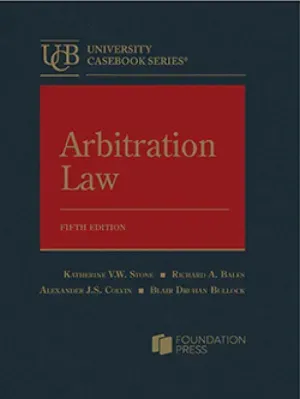Arbitration Law, Fifth Edition
Publication Date: November 19, 2024
Arbitration Law (University Casebook Series, West Academic, 5th ed. 2024) is a comprehensive casebook on arbitration co-authored by Katherine V.W. Stone, Richard A. Bales, Alexander J.S. Colvin, and Blair Druhan Bullock. The book surveys the law of arbitration across a wide range of contexts, including commercial arbitration, labor arbitration, employment arbitration, international arbitration, and sports arbitration. It equips students and practitioners with the doctrinal foundation and analytic tools needed to navigate arbitration agreements, defenses, due process requirements, judicial review, and statutory frameworks.
The first four chapters address arbitration agreements under the Federal Arbitration Act (FAA), including enforceability, defenses such as unconscionability, arbitral procedure, and judicial review. Chapter 5 explores arbitration in the labor-management context under the Labor Management Relations Act. Chapter 6 turns to international commercial arbitration, covering arbitration agreements, the role of courts, enforcement of awards, and investor-state disputes. The newly added Chapter 7 addresses sports arbitration, with sections on grievance arbitration, salary disputes, doping cases under the United States Anti-Doping Agency, and international sports arbitration through the Court of Arbitration for Sport.
The Fifth Edition reflects significant legal developments since the prior edition. It incorporates more than a dozen new U.S. Supreme Court decisions interpreting the FAA, including Viking River Cruises and Southwest Airlines v. Saxon. It provides extensive coverage of class action waivers, mass arbitration filings, and recent statutory reforms such as the Ending Forced Arbitration of Sexual Assault and Sexual Harassment Act of 2021. The book also expands coverage of online arbitration and procedural safeguards in light of the growing prevalence of remote hearings.
Designed for law school courses in arbitration, labor law, employment law, and dispute resolution, the book is equally valuable for practitioners seeking an authoritative reference on arbitration law. By revisiting fundamental concepts from contracts and civil procedure through the lens of arbitration, it deepens understanding of the interaction between substantive law and arbitral process. With its blend of case law, statutes, commentary, and problems, Arbitration Law remains an essential resource for those studying or practicing in this dynamic and rapidly evolving field.


